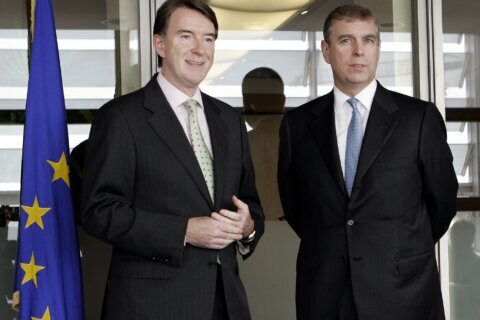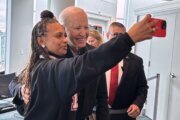When President Donald Trump arrived in the United Kingdom this week, he landed bang in the middle of a huge political fight about the country’s National Health Service.
One of the biggest issues in the UK election slated for December 12 is what a trade deal with the United States after Brexit might look like, and whether or not it would allow American pharmaceutical companies to charge the NHS more for their drugs.
There’s a huge amount at stake. The United Kingdom is a wealthy nation with an aging population and a state-funded health care system. The King’s Fund, a health policy think tank, estimates that the NHS spent $22.7 billion on medicines in England alone in 2017. Billions more would have been spent in Scotland, Wales and Northern Ireland.
Not very much of that money was spent on US imports. For example, the US drug industry exported nearly $56 billion in biopharmaceuticals in the same year, according to PhRMA, a trade association, but the United Kingdom accounted for only $3.6 billion of that haul.
PhRMA declined to comment for this story, but earlier this year it urged US trade negotiators to bring home a deal that would boost exports to the United Kingdom.
Both main British political parties have made misleading claims during the campaign. Jeremy Corbyn, leader of the opposition Labour Party, says that Prime Minister Boris Johnson is so eager to strike a trade deal with Trump that he will sell out the NHS, exposing it to higher prices for prescription drugs and allowing services to be privatized. Johnson has repeatedly said that the NHS is not, and never will be, on the table in trade talks.
The reality is more complicated. It’s unlikely that many US companies want to take over large parts of the bureaucratic NHS. But securing a bigger share of the British market for American pharmaceutical companies such as Pfizer and Merck would be a big prize for US trade negotiators.
Fueling concern in the United Kingdom is the fact that prescription drugs cost more in the United States than almost anywhere else on the planet. And the United States spends more than double the United Kingdom per capita on medicines.
There are numerous reasons for this. But a common complaint of the US pharmaceutical lobby is that other nations, including the United Kingdom, have strict regulatory systems and arrangements where governments subsidize medicine development that they believe keeps the price of drugs artificially low. This, they claim, makes it very hard for US companies to compete.
The UK system for valuing medicines is particularly complicated. It looks at the clinical effectiveness of a drug, and the bang for buck value of each medicine. It also takes into consideration input from drug companies before determining what it believes is a fair price.
The United States has publicly declared that it would demand not only that its companies have “full market access” to the United Kingdom, but also that “government regulatory reimbursement regimes are transparent.” That would likely mean a provision allowing US drug companies to have a greater say in how the United Kingdom values medicines for the NHS, similar to one included in the US trade deal with South Korea last year.
The US pharmaceutical industry would like to see “rules around how drug pricing and government reimbursement for pharmaceuticals is reached” in any deal with the United Kingdom, says Allie Rennison, head of European and trade policy at the Institute of Directors.
Why is America so obsessed with this?
If the United States is able to get its way, American companies could charge the NHS more for prescription medicines. The Labour Party claims the bill could rise by as much as £500 million ($655 million) a week, though this seems to be a projection based on an unlikely worst-case scenario.
But the NHS is only the start.
One side effect of the UK system is that it has a comprehensive list of drug prices, and some other countries informally use this as a benchmark for setting drug prices in their health care systems. In 2010, the British parliament published a document which claimed that “up to 25% of world pharmaceuticals sales reference UK prices to some extent.”
If the United States can get a provision that allows it to influence UK drug prices into a trade deal with the United Kingdom, then, in theory, drug prices around the world could rise.
“The UK system is a benchmark in all sorts of ways. That might be specific decisions on pricing or whether it allows a drug to be used in the NHS,” says Mark Dayan, a policy analyst at Nuffield Trust, another health think tank. “Decisions made in the UK will be noticed internationally and could affect how decisions are made in other countries.”
Getting a sweet deal with the United Kingdom would provide another boost for both the drug lobby and US trade negotiators: it would set a precedent for any future US trade deals with other countries.
The UK is a soft target
“Trade deals rely on precedents. If the US hasn’t managed to secure something in any previous agreement, it’s harder to argue for it in a new one,” says Dmitry Grozoubinski, founder of ExplainTrade.com and visiting professor at the University of Strathclyde.
While it might seem odd that a wealthy ally like the United Kingdom is deemed the best place for Washington to push its luck, the issue has to be seen in the context of the Brexit crisis.
“If after the election, a post-Brexit UK is led into trade talks by a prime minister and trade minister who campaigned on a quick and easy US trade deal, the US will seize that opportunity to push the boundaries of what’s possible,” says Grozoubinski. “It doesn’t mean they’re going to get what they want, but it would be near negligent of them not to try.”
And there’s evidence to suggest that’s precisely what will happen. Earlier this year, a representative from the US pharmaceutical industry said in a hearing hosted by the US Trade Representative that in any trade deal with the United Kingdom, it would seek to expand from the “strong baseline” that the United States agreed with South Korea on pricing and market access. The US-South Korea agreement contained a provision which effectively meant that US companies could contest the value placed on drugs approved by the South Korean health service.
So, will it happen?
Johnson’s Conservative Party wrote in its manifesto that “the price the NHS pays for drugs will not be on the table.” While that might sound like an unequivocal stance, when it comes to the crunch in any trade talks, the issue may be buried in legal language that could sneak around this explicit claim. And trade talks are far from sexy, so it’s hard to see the gritty details making the front page of many newspapers.
And of course, in any trade talks, the United States will be the stronger partner. When, or if, the talks get going, the United States simply won’t need the deal as much as the United Kingdom. So, Johnson will be faced with a tough choice: sign on the dotted line, or walk away empty handed and admit that his post-Brexit utopia isn’t quite as rosy as he claimed.
— CNN’s Rory Sullivan contributed to this report.







